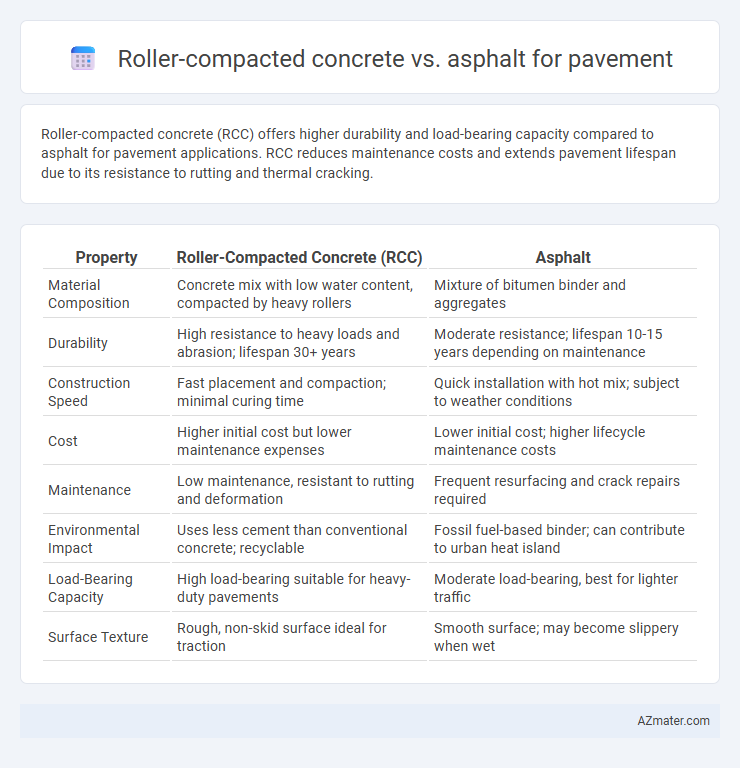Roller-compacted concrete (RCC) offers higher durability and load-bearing capacity compared to asphalt for pavement applications. RCC reduces maintenance costs and extends pavement lifespan due to its resistance to rutting and thermal cracking.
Table of Comparison
| Property | Roller-Compacted Concrete (RCC) | Asphalt |
|---|---|---|
| Material Composition | Concrete mix with low water content, compacted by heavy rollers | Mixture of bitumen binder and aggregates |
| Durability | High resistance to heavy loads and abrasion; lifespan 30+ years | Moderate resistance; lifespan 10-15 years depending on maintenance |
| Construction Speed | Fast placement and compaction; minimal curing time | Quick installation with hot mix; subject to weather conditions |
| Cost | Higher initial cost but lower maintenance expenses | Lower initial cost; higher lifecycle maintenance costs |
| Maintenance | Low maintenance, resistant to rutting and deformation | Frequent resurfacing and crack repairs required |
| Environmental Impact | Uses less cement than conventional concrete; recyclable | Fossil fuel-based binder; can contribute to urban heat island |
| Load-Bearing Capacity | High load-bearing suitable for heavy-duty pavements | Moderate load-bearing, best for lighter traffic |
| Surface Texture | Rough, non-skid surface ideal for traction | Smooth surface; may become slippery when wet |
Introduction to Roller-Compacted Concrete and Asphalt Pavements
Roller-compacted concrete (RCC) is a dry, densely compacted concrete mixture used for pavement construction, offering high durability and load-bearing capacity in heavy-traffic areas. Asphalt pavement consists of a flexible mixture of aggregates and bitumen, providing smooth surface texture and cost-effective installation for roads and highways. Both materials serve crucial roles in infrastructure, with RCC favored for long-term strength and asphalt preferred for ease of repair and smoother ride quality.
Key Material Differences: RCC vs Asphalt
Roller-compacted concrete (RCC) is a dry, stiff mix of cement, aggregate, and water placed with asphalt paving equipment, offering higher compressive strength and durability than asphalt. Asphalt consists of bitumen binder mixed with aggregates, providing flexibility and easier repair but lower structural load capacity compared to RCC. The key material difference lies in RCC's cementitious matrix which ensures enhanced resistance to deformation, whereas asphalt relies on viscoelastic properties for flexibility in pavement applications.
Construction Processes Compared
Roller-compacted concrete (RCC) involves spreading a dry concrete mixture with low water content and compacting it with heavy rollers, enabling rapid placement and curing for durable pavements. Asphalt pavement construction requires heating asphalt binder and aggregates, followed by layering and compaction, which allows temperature-sensitive processes and generally quicker initial opening to traffic. RCC offers higher load-bearing capacity and resistance to deformation under heavy traffic, while asphalt provides greater flexibility and easier maintenance in fluctuating climates.
Durability and Longevity Analysis
Roller-compacted concrete (RCC) offers superior durability compared to asphalt, with enhanced resistance to rutting, moisture damage, and heavy traffic loads, resulting in a lifespan often exceeding 30 years. Asphalt pavements require more frequent maintenance due to susceptibility to cracking, oxidation, and softening under high temperatures, typically lasting 15 to 20 years with proper upkeep. RCC's high compressive strength and low permeability contribute to longer service life and reduced lifecycle costs, making it a preferred choice for heavy-duty and high-traffic pavement applications.
Load-Bearing Capacity and Performance
Roller-compacted concrete (RCC) exhibits superior load-bearing capacity compared to asphalt, making it ideal for heavy-duty pavement applications such as industrial yards and highways with high traffic volumes. The high compressive strength and durability of RCC ensure long-term performance with minimal deformation under heavy loads, whereas asphalt often requires more frequent maintenance due to rutting and cracking. RCC's rigid structure distributes loads more effectively, reducing the risk of pavement failure and enhancing overall lifespan in demanding environments.
Maintenance Demands and Lifecycle Costs
Roller-compacted concrete (RCC) pavements exhibit significantly lower maintenance demands compared to asphalt due to their high durability and resistance to rutting and deformation. Asphalt pavements require frequent resurfacing, crack sealing, and periodic overlays, which increase lifecycle costs over time. Although RCC has a higher initial installation cost, its reduced maintenance needs and extended service life typically result in lower total lifecycle costs.
Environmental and Sustainability Considerations
Roller-compacted concrete (RCC) offers enhanced environmental benefits over asphalt due to its lower lifecycle carbon footprint and higher durability, reducing the frequency of maintenance and reconstruction. RCC's production consumes less energy and releases fewer greenhouse gases compared to asphalt, which relies heavily on petroleum-based binders contributing to environmental pollution. The porous nature of RCC also improves stormwater management and reduces urban heat island effects, making it a more sustainable pavement option.
Climate Suitability and Application Scenarios
Roller-compacted concrete (RCC) demonstrates superior durability and resistance to high temperatures, making it ideal for hot climates and heavy load applications such as industrial yards and airport runways. Asphalt provides greater flexibility and faster installation, better suited for colder climates with freeze-thaw cycles and urban roads requiring frequent maintenance and rapid opening to traffic. RCC excels in long-term performance under extreme weather, while asphalt offers cost-effective solutions for variable climates and less intensive traffic conditions.
Safety and Surface Characteristics
Roller-compacted concrete (RCC) pavement offers superior skid resistance and durability compared to asphalt, enhancing overall road safety by reducing hydroplaning risks and improving traction under wet conditions. The rigid nature of RCC minimizes rutting and pothole formation, maintaining a smoother surface profile for consistent vehicle control. Asphalt, while more flexible and easier to repair, tends to soften and deform under high temperatures, increasing the potential for surface irregularities that can compromise safety.
Cost Comparison: Initial and Long-Term Investments
Roller-compacted concrete (RCC) typically requires a higher initial investment compared to asphalt due to material and construction techniques but offers superior durability and reduced maintenance costs over time. Asphalt pavements present lower upfront costs and faster installation, yet entail more frequent repairs and resurfacing expenses throughout their lifespan. Evaluating long-term investments reveals RCC as more cost-effective for heavy-traffic or industrial applications, while asphalt suits projects prioritizing initial budget constraints and flexibility.

Infographic: Roller-compacted concrete vs Asphalt for Pavement
 azmater.com
azmater.com